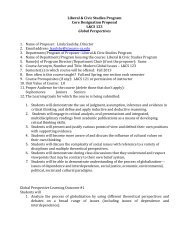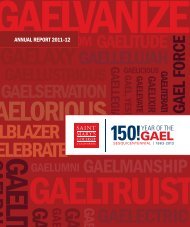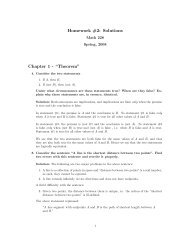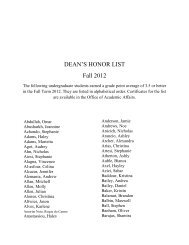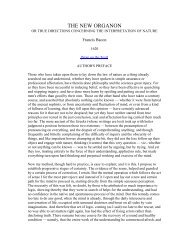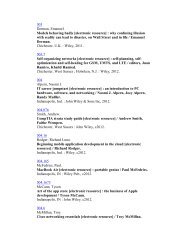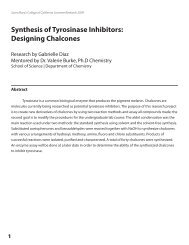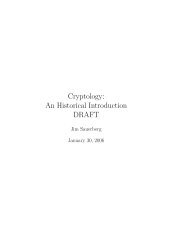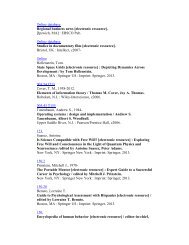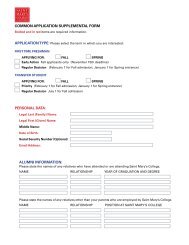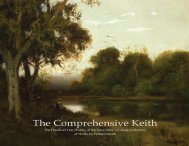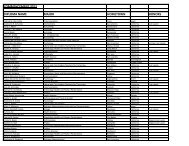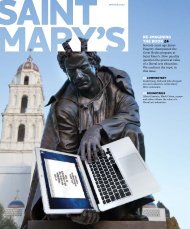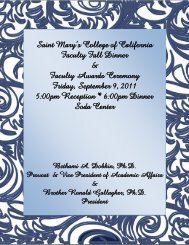2008-09 Catalog - Saint Mary's College of California
2008-09 Catalog - Saint Mary's College of California
2008-09 Catalog - Saint Mary's College of California
You also want an ePaper? Increase the reach of your titles
YUMPU automatically turns print PDFs into web optimized ePapers that Google loves.
Curriculum HistoryHistoryIn <strong>of</strong>fering a disciplined study <strong>of</strong> the past, the History Department attempts to provide perspective on a wide variety <strong>of</strong>issues that arise out <strong>of</strong> the tensions societies have to face in every generation — tensions between freedom and authority,between reason and faith, between free will and impersonal forces. The department aims to promote the ability to readcritically and to write coherently, and it also attempts to meet the needs <strong>of</strong> students with varying objectives: the historymajor, the student from another department seeking a broader background for his or her own discipline, or the studentwho is simply curious about a specific age, society, or problem. In each course the history faculty seeks to cultivate understandingrather than simply memorization <strong>of</strong> facts, in the belief that the experience gained through systematic analysis <strong>of</strong>historical issues equips students not only for the teaching <strong>of</strong> history or for advanced study in history and related fields butalso for the study <strong>of</strong> law, journalism, or library science; for the pursuit <strong>of</strong> careers in local, state, or national public service;and for business positions that demand literate, imaginative, and resourceful people.The department also participates in interdisciplinary majors in area studies: American Studies, Latin American Studies,and European Studies. For requirements in American Studies, consult with the department chair. For Latin American andEuropean Studies, see International Area Studies, p. 113.FacultyBrother Charles Hilken, FSC, Ph.D., Pr<strong>of</strong>essor, ChairJohn A. Dennis, Ph.D., LecturerCarl J. Guarneri, Ph.D., Pr<strong>of</strong>essorRonald Isetti, Ph.D., Pr<strong>of</strong>essor EmeritusGretchen Lemke-Santangelo, Ph.D., Pr<strong>of</strong>essorMicah Muscolino, Ph.D., Assistant Pr<strong>of</strong>essorKatherine S. Roper, Ph.D., Pr<strong>of</strong>essorMyrna Santiago, Ph.D., Associate Pr<strong>of</strong>essorLearning OutcomesWhen students fulfill the requirements <strong>of</strong> the history major they will be able to:• Think historically, read critically, write coherently, and speakpersuasively.• Situate major historical events within their proper chronological,geographical, thematic, and comparative context.• Connect and integrate historical knowledge, grasp the ethicaland moral dimensions <strong>of</strong> history, and appreciate the complex, <strong>of</strong>tenmulti-causal origins <strong>of</strong> past events.• Identify and interpret a wide variety <strong>of</strong> historical sources, bothprimary and secondary.• Explain the value and application <strong>of</strong> historiography and varioushistorical methods, approaches and theories.• Evaluate and critically assess the validity <strong>of</strong> historical evidenceand interpretations.• Use primary and secondary sources to construct sophisticated, persuasive,and logical interpretations <strong>of</strong> historical problems and events.Major RequirementsLower DivisionHistory 1, 2, or 4, 5; 17, 18. (History 1, 2 is the World Historysequence; History 4, 5 is the Western Civilization sequence. Studentsmay combine History 1 and 5 or History 2 and 4, but may not combineHistory 1 and 4 or History 2 and 5.)Upper DivisionStudents majoring in history must complete eight upper-division historycourses, including:One course in specific problems <strong>of</strong> research and writing (History 103)and one course in either historical interpretation (History 104) orhistorical theory (History 105).Two upper-division courses in two <strong>of</strong> the following areas <strong>of</strong> concentrationand one in a third area <strong>of</strong> concentration (at least one area <strong>of</strong>concentration must be in Asian, African, or Latin American history).United States: History 130 (when applicable), 131, 132, 133, 134,135, 136, 137, 138, 139, 140, 141, 142Latin America: History 150 (when applicable), 151, 152, 153, 154, 155Medieval Europe: History 110 (when applicable), 111, 112, 113Modern Europe: 110 (when applicable), 113, 114, 115, 116, 117, 118, 119Africa: History 170 (when applicable), 171, 172Asia: History 160 (when applicable), 161, 162An upper-division elective, chosen from any <strong>of</strong> the HistoryDepartment’s courses.Students intending to work toward advanced degrees should consultwith their advisor about foreign language preparation.106



